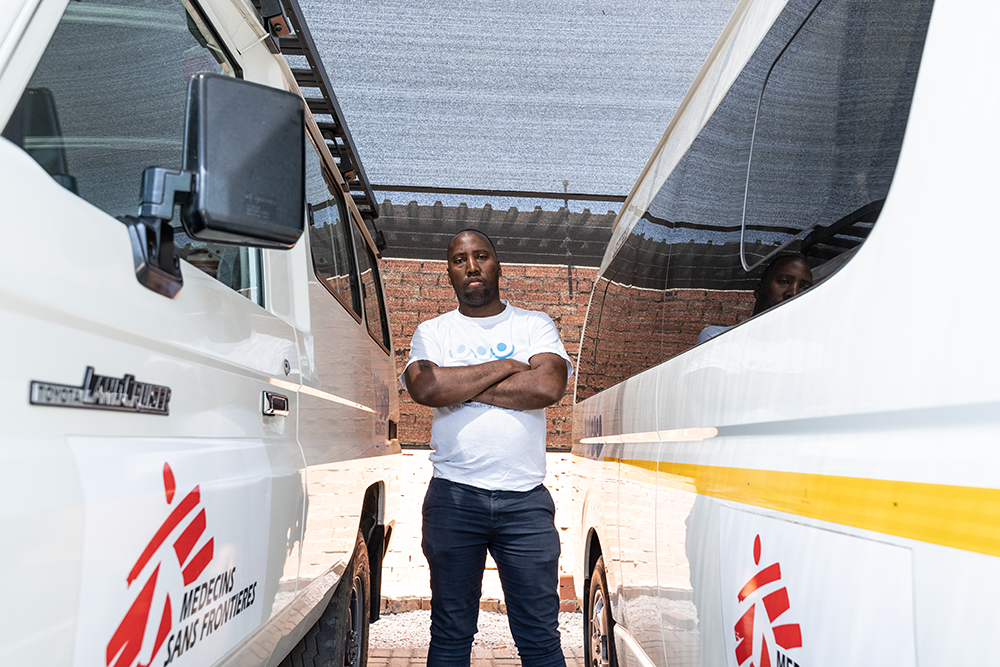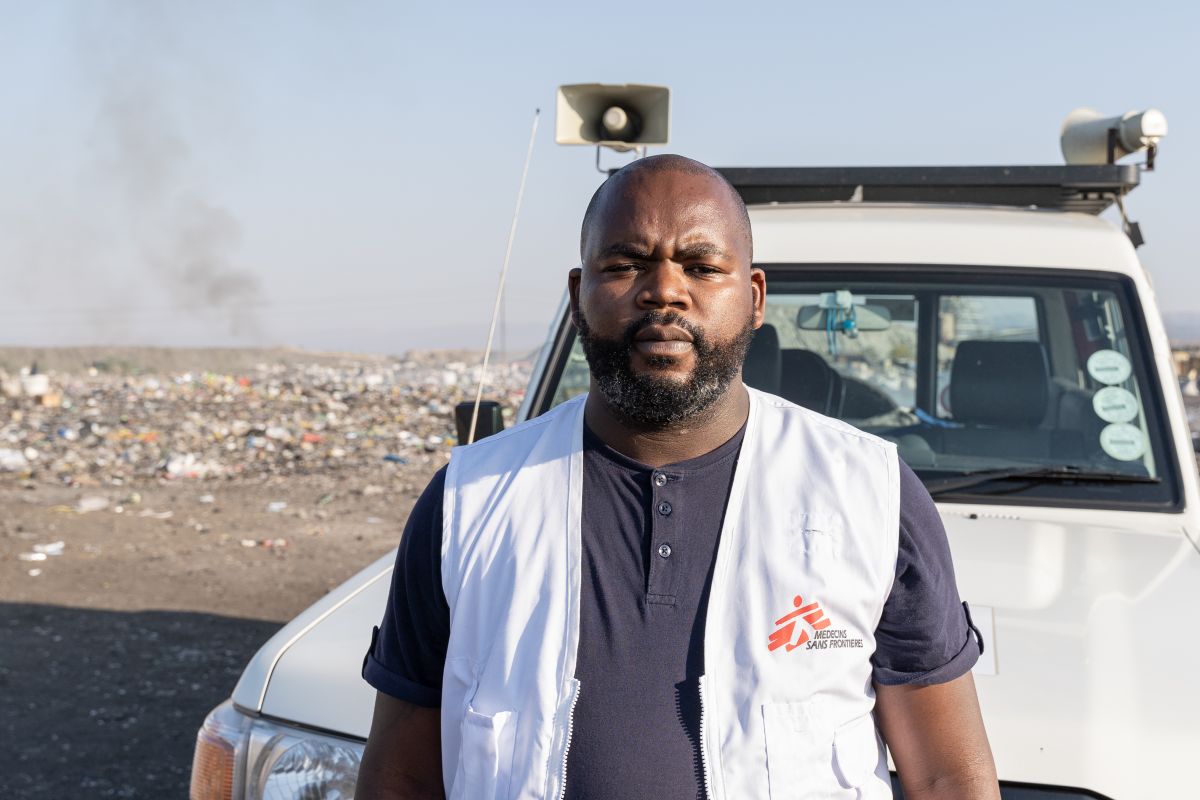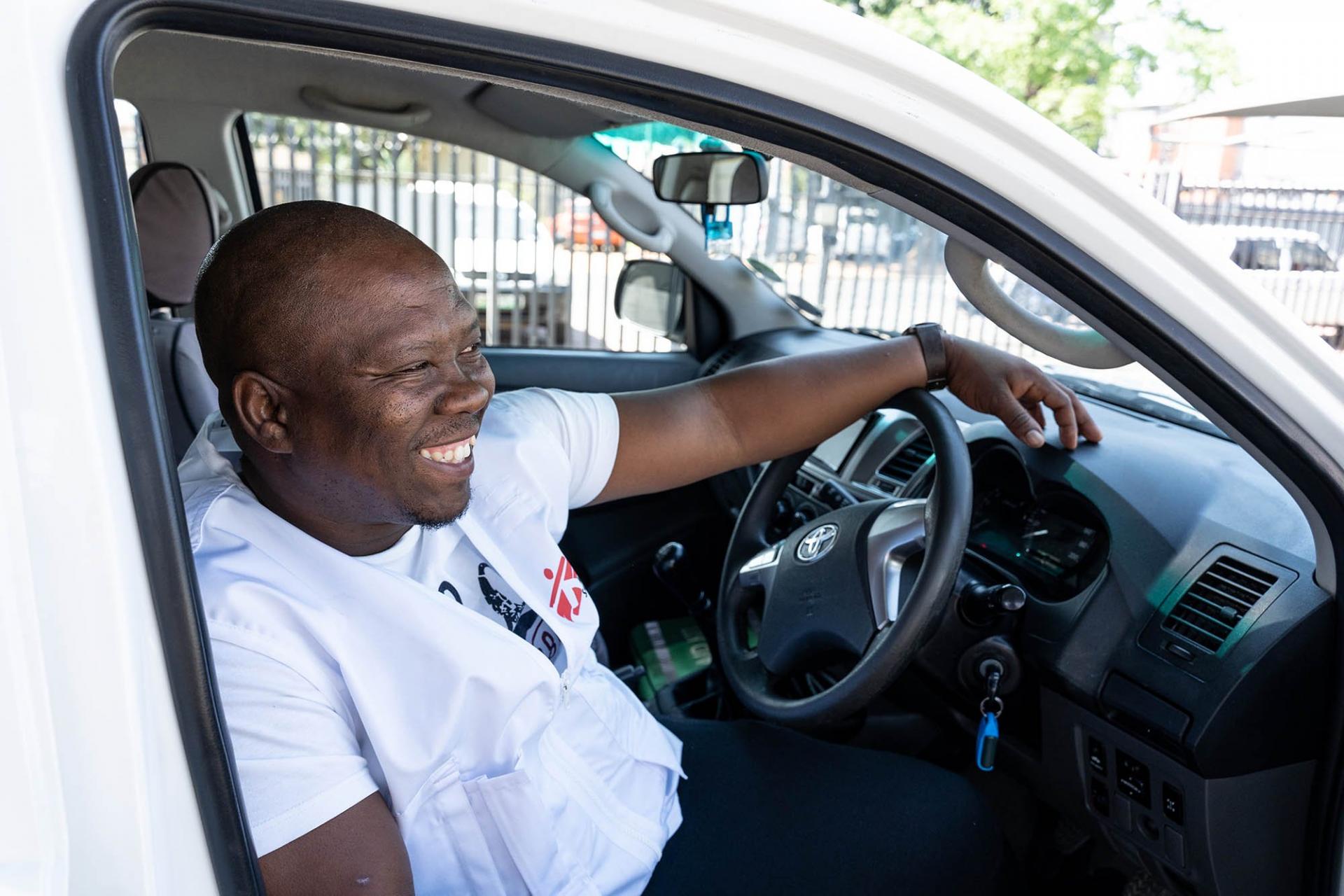A new short film called ‘Driving Change in South Africa’, told through the eyes of a driver working for MSF’s sexual violence project shows that everyone has a role to play in a survivor’s journey to care – especially men.
Lebogang Seketema – known to friends and colleagues as Lebo - knows the pain and suffering that sexual violence can cause those who survive it. His sister was raped by a neighbor when she was nine years old. With little access to care then, the family chose to put it behind them and she never opened up about her experience.
But things have changed. For the last three years, Lebo has worked as a driver in a sexual and gender-based violence project run by Doctors Without Borders/Medecins Sans Frontieres (MSF) in Rustenburg, located in the stark and arid landscape of South Africa’s platinum mining belt. In the informal settlements sprawling around the area’s mines, men outnumber women by 120 to 100.

A potent mix of historical structural violence, economic hardship and reinforced traditional gender dynamics mean many women, especially those with children, are dependent on male partners for survival. This leaves them particularly vulnerable to sexual and gender-based violence. In 2015, an MSF survey of 800 women in the Rustenburg municipality found that one in four women had experienced rape in their lifetime, with an estimated 11,000 women and girls being raped annually in this area alone.
Tragically, 95% of women in the study had never reported their rape to a healthcare worker, many out of fear and shame, and limited knowledge about the importance of seeking immediate care. South Africa is already known for some of the world’s highest rates of rape and femicide (female murder), with 52,420 sexual offences reported nationally in 2018. Yet the data, including from MSF’s study suggests that this figure may be much higher.
Each day, Lebo and seven other male drivers rotate responsibilities to collect and transport survivors of sexual violence – or clients as they call them – for emergency medical and psychological care in one of four ‘Kgomotso Care Centers’ (KCC) that MSF runs in partnership with the North West Department of Health in Rustenburg and Madibeng After consultations, the drivers often return them home again.
Kgomotso means “comfort” in the local Setswana language. Each center is staffed with forensic nurses, registered counselors and social workers who offer clients a package of care to treat their injuries, help prevent HIV, sexually transmitted infections and unwanted pregnancies. They also offer essential psychological counseling and link women to critical social and legal support.
As first responders, MSF drivers are often the first person a survivor meets following an incident. Their role in the survivor’s journey of care is a vital part of the approach MSF takes to ensure humane, non-intrusive and supportive care for survivors from the start.
Yet like Lebo, all the drivers have become acutely aware of what their identity as men represents for victims in a society where the vast majority of sexual abuse across South Africa is perpetrated by men.
As such, MSF’s drivers have received psychological first aid training on how to engage survivors with compassion while avoiding any secondary trauma. The principles of psychological first aid - which offers initial support to anyone facing a crisis - entails assessing the immediate situation, building trust and rapport with survivors, and helping to link them safely with the next stage of care.
“You can imagine I am a man, and the lady has been abused by a man, says Lebo. She has to get inside the car, and sometimes I’m alone inside the car with her. So, you know how it feels... You have to let her know that she’s in a safe place, that she’s safe with you.”For survivor Poppy Makgobatlou, from Babong district in Rustenburg, her first encounter with an MSF driver left a lasting impression. After many years of abuse from her now ex-husband, Poppy finally gathered the courage to seek help from MSF. After logging a call with the 24-hour hotline for survivors to report her case, an MSF driver came to collect her.
“I was crying, then [the driver] says, ‘I don’t know how much pain you feel, I cannot tell you it’s going to be okay, because I don’t know for how long have you been living like this, but what I can tell you is just try to be strong’,” explains Poppy, who received treatment in the MSF-supported KCC in Babong.

As awareness of the KCCs grows, an increasing number of survivors are seeking care. In 2015, the first KCCs in Rustenburg received 62 cases of sexual and gender-based violence. Today, the four centers received a combined total of 1,266 new cases in 2018, and 657 new cases within the first half of 2019. Many cases are now referred from MSF’s growing community activities which raise awareness around sexual and gender-based violence. MSF also trains local leaders as ‘first responders’ to identify survivors and provide immediate support to link them to care.
For Lebo and the other drivers, working for MSF and meeting survivors has changed their own understanding of violence, and the role each of them can play in changing other men’s mindsets. Beyond their day job, each driver is taking an active role in driving change in their communities.
Read more about MSF's Drivers for Survivors who are changing lives in Rustenburg.
About MSF’S RESPONSE TO SEXUAL VIOLENCE IN SOUTH AFRICA
In September 2019, MSF launched a short documentary film, ‘Driving Change in South Africa’ that follows Lebo’s journey as an MSF driver and life as a father to a young daughter The film highlights high levels of sexual violence in South Africa and the role that everyone can play in linking survivors to immediate medical and psychological care – especially men. In South Africa, MSF is calling for all survivors of sexual violence to have immediate and longer term access to complete medical, psychological care and social support.
Since 2015, MSF has been working with the North West Department of Health to expand access to free, high quality and confidential care for survivors of sexual and gender-based violence in Rustenburg’s Bojanala district through four dedicated clinics, known as Kgomotso Care Centres (KCCs). MSF teams, including forensic nurses, psychologists, registered counselors, social workers and social auxiliary workers and support staff including drivers provide clients with an essential package of free emergency and follow-up care as well as referrals for social and legal services. An increasing number of survivors are being referred from MSF’s community-based initiatives in Rustenburg’s Freedom Park and Sondela areas. This includes a schools program that educates learners about sexual and reproductive health as well as gender-based violence. The program, which screens learners for signs of sexual violence as they are a vulnerable group, has reached 25 500 learners across 20 schools in the district since early 2018. From 2017 to 2019, the four MSF-supported KCCs in Rustenburg provided care for 3007 clients.
FOR MORE INFORMATION see MSF’s Untreated Violence report series from Rustenburg:
- UNTREATED VIOLENCE: The Need for patient-centred care for survivors of sexual violence on the Platinum Mining Belt (2016)
- UNTREATED VIOLENCE: Critical gaps in medical and clinical forensic care for survivors of sexual violence in South Africa (2017)
- UNTREATED VIOLENCE: Critical gaps in mental health care for survivors of sexual violence in South Africa (2018)
